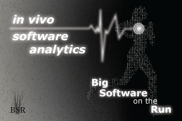BSR Winter school organized by TU/e, TUDelft and UTwente
Hands-on sessions
The BSR winter school program includes three hands-on sessions of two hours each. Each session is split into two parts. The first part (1 hour) follows a tutorial style in which the session topic, tool and techniques are introduced and practiced. The second part (1 hour) consists of a mini-challenge. Participants will be given data sample to analyze using techniques and tools introduced in the tutorial part. The results will be collected and reviewed by the BSR scientific committee. The winner of the session will be announced during dinner.
More information about each session are given below. Please make sure to bring your laptop with the required tools installed on it.
1st session on Monday, October 24
- Organizer: Architecture of Information Systems (AIS) group at TU/e (https://www.win.tue.nl/ais/ ). The AIS group investigates methods, techniques and tools for the design and analysis of process-aware information systems. AIS’s mission is to bridge the gap between process science and data science. This explains the focus on Process Mining.
- Session title: Software Process Mining with ProM
- Session chair: Wil van der Aalst.
- Session lecturers: Nour Assy assisted with Maikel Leemans and Cong Liu
- Objectives: This session is the technical part of the Process Mining lecture given by Prof. Wil van der Aalst on Monday 24th from 9:00 to 10:30. In the first part of the session, you will learn how to import and inspect your software event log in the free and open source process mining tool “ProM”. You will also learn to execute some of the core process mining techniques mainly discovery, conformance, and performance analysis. At the end of this part, you will be able to use ProM and answer the following questions:
- I have an event log from software execution. How can I import it in ProM?
- From where do I start my analysis and what to analyze?
- How can I inspect my data? How can I get a bird’s-eye view?
- How my software is being really executed? How can I discover its process?
- How can I analyze the performance of my software and detect bottlenecks?
- How can I predict software failures and delays?
- Tools & installation instructions: We will use “ProM Lite 1.1”, a release of ProM for end users. The download and instructions can be found here: http://www.promtools.org/doku.php?id=promlite11. Please note that an internet access is required for the first time your run ProM Lite. The first run will also take a while to downaload all required packages.
- Data: You can download the data that will be used from here: monday-handson.zip
- Requirements: Prior knowledge in software analytics, data science and/or business process management (BPM) is preferred but not required.
2nd session on Tuesday, October 25
- Organizer: Delft University of Technology
- Session title: Active automata learning
- Session chair: Sicco Verwer.
- Session lecturers: Sicco Verwer
- Objectives: to be annouced
3rd session on Thursday, October 27
- Organizer: Formal Methods and Tools (FMT) research group at the UT (http://fmt.cs.utwente.nl/). The FMT group develops and uses formal techniques and tools as means to support the development of software. This includes the development of formal theories of concurrency, design methodologies for distributed systems, and correctness assessment using verification or validation techniques.
- Session title: Program verification
- Session chair: Jaco van de Pol
- Session lecturers: Jaco van de Pol with Arnd Hartmanns, Vincent Bloemen, and Freark van der Berg
- Objectives: This session is concerned with static verification of programs, which is related to the lecture on Reliable Concurrent Software by Prof. Marieke Huisman on Thursday 27th from 14:00 to 15:30. In the first part of the session, you will learn how static verification can be used in practice to verify the functional correctness of programs. The online tool “Dafny” is used to demonstrate this. In the second part of the session, you will get hands-on experience with Dafny and put the verification techniques in practice to solve several challenging problems. At the end of the session, you will be able to formally reason about the functional behavior of a program and proof its correctness.
- Tools & installation instructions: We will use the latest version of the online “Dafny” tool. It is available at http://rise4fun.com/Dafny and can be used directly from the browser. Please note that internet access is required for using Dafny.
- Requirements: Prior knowledge in formal verification is preferred but not required.





